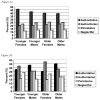Parenting style and family meals: cross-sectional and 5-year longitudinal associations
- PMID: 20630160
- PMCID: PMC2906915
- DOI: 10.1016/j.jada.2010.04.011
Parenting style and family meals: cross-sectional and 5-year longitudinal associations
Abstract
Background: Research on family meals in the past decade has shown a positive association between family meal frequency and adolescent healthy dietary intake. However, less is known about factors within the home environment, such as parenting style, that may be associated with family meal patterns.
Objective: The purpose of this study is to test cross-sectional and 5-year longitudinal associations between parenting styles (authoritative, authoritarian, permissive, and neglectful) and the frequency of family meals among adolescents.
Study design: Data were from Project Eating Among Teens, a population-based study comprised of youth from diverse ethnic/racial and socioeconomic backgrounds. Two cohorts of adolescents (middle school and high school) completed in-class surveys in 1999 (Time 1) and mailed surveys in 2004 (Time 2). Multiple linear regression models were used to predict mean frequency of family meals at Time 1 and Time 2 from adolescent report of parenting style (both mother and father) at Time 1. Cross-sectional analyses included both adolescent cohorts (n=4,746) and longitudinal analyses included only the younger cohort (n=806) because family meal frequency was not assessed in the older cohort at Time 2.
Results: Cross-sectional results for adolescent girls indicated a positive association between maternal and paternal authoritative parenting style and frequency of family meals. For adolescent boys, maternal authoritative parenting style was associated with more frequent family meals. Longitudinal results indicated that authoritative parenting style predicted higher frequency of family meals 5 years later, but only between opposite sex parent/adolescent dyads.
Conclusions: Future research should identify additional factors within the home environment that are associated with family meal frequency to develop effective interventions that result in increased family meals for youth. Also, future research should investigate the mealtime behaviors of authoritative parents and identify specific behaviors that dietetics practitioners and other health care providers could share with parents of adolescents to help them increase family meal frequency.
Copyright 2010 American Dietetic Association. Published by Elsevier Inc. All rights reserved.
Figures


Similar articles
-
Parenting style as a predictor of adolescent weight and weight-related behaviors.J Adolesc Health. 2010 Apr;46(4):331-8. doi: 10.1016/j.jadohealth.2009.08.004. J Adolesc Health. 2010. PMID: 20307821 Free PMC article.
-
Longitudinal associations between parenting style and adolescent disordered eating behaviors.Eat Weight Disord. 2015 Jun;20(2):187-94. doi: 10.1007/s40519-014-0154-z. Epub 2014 Sep 16. Eat Weight Disord. 2015. PMID: 25223882
-
Parenting styles, family structure and adolescent dietary behaviour.Public Health Nutr. 2010 Aug;13(8):1245-53. doi: 10.1017/S1368980009992217. Epub 2009 Dec 3. Public Health Nutr. 2010. PMID: 19954574
-
A review of familial correlates of child and adolescent obesity: what has the 21st century taught us so far?Int J Adolesc Med Health. 2009 Oct-Dec;21(4):457-83. doi: 10.1515/ijamh.2009.21.4.457. Int J Adolesc Med Health. 2009. PMID: 20306760 Free PMC article. Review.
-
Promoting family meals: a review of existing interventions and opportunities for future research.Adolesc Health Med Ther. 2015 Jun 22;6:115-31. doi: 10.2147/AHMT.S37316. eCollection 2015. Adolesc Health Med Ther. 2015. PMID: 26124690 Free PMC article. Review.
Cited by
-
Differential Influences of Parenting Dimensions and Parental Physical Abuse during Childhood on Overweight and Obesity in Adolescents.Children (Basel). 2017 Mar 7;4(3):17. doi: 10.3390/children4030017. Children (Basel). 2017. PMID: 28272353 Free PMC article.
-
Association between self-reported household practices and body mass index of US children and adolescents, 2005.Prev Chronic Dis. 2012;9:E174. doi: 10.5888/pcd9.110149. Prev Chronic Dis. 2012. PMID: 23237244 Free PMC article.
-
Association between parental feeding practices and shared family meals. The Food4toddlers study.Food Nutr Res. 2020 Aug 5;64. doi: 10.29219/fnr.v64.4456. eCollection 2020. Food Nutr Res. 2020. PMID: 32952496 Free PMC article.
-
Positive parenting approaches and their association with child eating and weight: A narrative review from infancy to adolescence.Pediatr Obes. 2020 Oct;15(10):e12722. doi: 10.1111/ijpo.12722. Epub 2020 Sep 3. Pediatr Obes. 2020. PMID: 32881344 Free PMC article.
-
Examining multiple parenting behaviors on young children's dietary fat consumption.J Nutr Educ Behav. 2012 Jul-Aug;44(4):302-9. doi: 10.1016/j.jneb.2011.10.004. Epub 2012 May 14. J Nutr Educ Behav. 2012. PMID: 22591580 Free PMC article.
References
-
- Fulkerson JA, Neumark-Sztainer D, Story M. Adolescent and parent views of family meals. Journal of the American Dietetic Association. 2006;106(4):526–532. - PubMed
-
- Videon TM, Manning CK. Influences on adolescent eating patterns: The importance of family meals. Journal of Adolescent Health. 2003;32:365–373. - PubMed
-
- Gillman MW, Rifas-Shiman SL, Frazier AL, Rockett HRH, Camargo CA, Field AE, Berkley CS, Colditz GA. Family dinner and diet quality among older children and adolescents. Archives of Family Medicine. 2008;9:235–240. - PubMed
-
- Neumark-Sztainer D, Hannan PJ, Story M, Croll J. Family meal patterns: Associations with sociodemographic characteristics and improved dietary intake among adolescents. Journal of the American Dietetic Association. 2003;103:317–322. - PubMed
-
- Neumark-Sztainer D, Wall M, Story M, Fulkerson JA. Are family meal patterns associated with disordered eating behaviors among adolescents? Journal of Adolescent Health. 2004;35:350–359. - PubMed
Publication types
MeSH terms
Grants and funding
LinkOut - more resources
Full Text Sources
Medical
Miscellaneous

